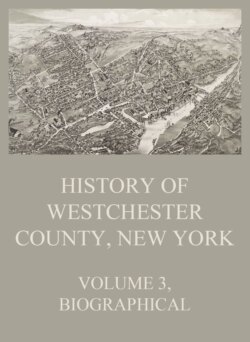Читать книгу History of Westchester County, New York, Volume 3 - Группа авторов - Страница 17
На сайте Литреса книга снята с продажи.
COOPER, JAMES FENIMORE
ОглавлениеJames Fenimore Cooper is another distinguished author who may be included among the literati of Westchester county, for his first novel was written while he resided at Mamaroneck. Cooper was born at Burlington, New Jersey. September 15, 1789. His father, Judge William Cooper, removed the following year to the neighborhood of Otsego lake, New York, where he had purchased a large tract of land, on which he established a settlement, to which he gave the name of Cooperstown. In this frontier home, in the midst of a population of settlers, trappers and Indians, young Cooper imbibed that knowledge of backwoods life and of the habits of the aborigines which afterward served him so well in the construction of his romances. At the age of thirteen he entered Yale College, and after remaining there three years received an appointment as midshipman in the United States Navy. In the latter he obtained, during the six years of his service, a familiarity with nautical life which he utilized with splendid results in his famous sea stories.
In 1811 Cooper resigned bis commission in the navy and married Miss De Lancey, a member of the well-known New York family of that name and sister of the bishop of western New York. They settled in the village of Mamaroneck, in Westchester county, and not long afterward Cooper's mind was accidentally turned to the field of fiction. One day, after reading an English novel, he remarked to his wife that he believed he could write a better story himself. To test the matter he wrote "Precaution." He had not intended to publish the novel, but was induced to do so by his wife and his friend, Charles Wilkes. The descriptions of English life and scenery gave it great popularity in England, where it was republished. " The Spy," which followed, was as thoroughly American, and obtained great success, not only in this country but abroad. It was almost immediately republished in all parts of Europe. " The Pioneers " was the first of the series of frontier and Indian stories, on which the novelist's reputation chiefly rests. It was followed by "The Pilot," the first of the sea stories. Other novels followed in quick succession, and Cooper's reputation grew apace. He was also sharply criticized and became involved in various controversies, which culminated finally in a series of libel suits against his detractors in the newspapers. In 1826 he visited Europe, and upon his return to this country made his home at Cooperstown, New York. During his residence abroad (1826-33) he was everywhere received with marked attention. His literary activity was unchecked by his wanderings, and during his stay in Europe he wrote a number of novels. After his return to this country he wrote the "Naval History of the United States," which excited an acrimonious discussion as to the correctness of his account of the battle of Lake Erie. In one of his libel suits Cooper defended, in person, the accuracy of his Version of the battle. A lawyer, who was an auditor of the closing sentences of his argument, remarked, " I have heard nothing like it since the days of Emmet."
Cooper continued to write with amazing fertility and vigor almost to the close of his life, which was terminated by dropsy, September 14, 1851. Notwithstanding his defects of style, his romances are. conceded to be among the most vivid and original of all American works of fiction. He was the first of his countrymen who obtained a wide recognition in other portions of the world. His works were translated into many languages, and the Indian tales especially were universal favorites in Europe. The great French novelist, Balzac, said of him, "With what amazing power has he painted nature! How all his pages glow with creative fire! Who is there writing English among our contemporaries, if not of him, of whom it can be said that he has a genius of the first order.? " " The empire of the sea," says the Edinburg Review, " has been conceded to him by acclamation; " and the same journal adds, "In the lonely desert or untrodden prairie, among the savage Indians, or scarcely less savage settlers, all equally acknowledge his dominion."
